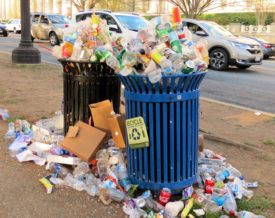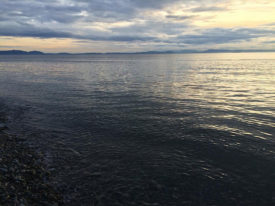 The Puget Sound Partnership—the agency leading the charge to recover the Sound—has been getting a lot of public scrutiny of late. A critical four-day investigation by KUOW’s John Ryan. A scolding editorial in the Tacoma News Tribune. An unfavorable audit by the state in May. A second look at missteps in financial oversight from Gov. Chris Gregoire’s office.
The Puget Sound Partnership—the agency leading the charge to recover the Sound—has been getting a lot of public scrutiny of late. A critical four-day investigation by KUOW’s John Ryan. A scolding editorial in the Tacoma News Tribune. An unfavorable audit by the state in May. A second look at missteps in financial oversight from Gov. Chris Gregoire’s office.
None of it has unearthed a smoking-gun of corruption or gross professional ineptitude. But they all indicate that the Partnership needs to shore up its operations. There’s been sloppiness in awarding contracts that hint at political favors. A situation with a whistleblower went south. It’s not been pretty.
But what may matter even more than these transgressions themselves (the Partnership’s Executive Director David Dicks vows the group has tightened up its financial dealings), is the challenge they create when it comes to the agency’s core mission: Saving Puget Sound.
The Partnership cannot, in less than a decade, return the Sound to health unless it has widespread and enthusiastic buy in from residents, businesses, and the nonprofit community. Without that, the agency is sunk. And all of these recent hits to its reputation and public trust have left the group taking on water.
Here’s what needs to happen:
- The Partnership needs to demonstrate that the financial and management snafus are truly a thing of the past, whether that means taking steps to increase transparency in contract awarding, some potentially painful house cleaning, or both.
- The Partnership needs to communicate. Get out there and make sure the public and the press are clear about what the agency is working on, what are its deadlines, and making sure they’re met. News out today marks a step in that direction. The agency has identified 20 “dashboard indicators” that will be used to measure how well the Partnership is working to “restore, protect and prevent pollution in Puget Sound.”
- It needs to lead. Dicks was behind the times in terms of supporting a key Sound-related bill during the past legislative session. He needs to be out front come 2011.
- And lead some more. Right now Ecology is developing new stormwater regulations. These rules are really important—they outline when and how low-impact development must be used in the state. So far, the Partnership is just another voice at the table, and not a very loud one at that. The agency knows the power of LID, but isn’t demanding that Ecology enact strong provisions for rain gardens, the preservation of native plants and trees, green roofs and other LID strategies.
- The Partnership needs to live up to its name. Rumblingsfrom the nonprofit community—the groups that have folks on the ground doing restoration work and drumming up support for the recovery of the Sound—suggest they’re not feeling the love from the agency. Dicks and his staff need to get everyone on board.
Stormy Puget Sound photo from Flickr user Chas Redmond under a Creative Commons license.








Josef
I’m not exactly convinced the Puget Sound needs “saving”. Doubly so with such antics.There are many great environmental errors on a local level such as fecal coliform, Tesoro refinery explosion and lack of adequate mass transit yes. But Puget Sound endangered? I doubt it. Plz convince me.
Bill B
“unless it has widespread and enthusiastic buy in from residents, businesses, and the nonprofit community”oops, forgot government. sadly the PSRC looks to add a couple of million more residents in the coming decades to the region. it is unclear how this added human activity can help the health of the Sound. and local government (Seattle in particular) does everything possible to emasculate or avoid SEPA analysis and implementation of any mitigation.with a region hungry for growth – and doing everything it can to enable it – the Puget Sound will continue to be at the losing end of the equation regardless of what agencies like PSP does rightly or wrongly.(note to JOSEF, watch http://www.pbs.org/wgbh/pages/frontline)/poisonedwaters/